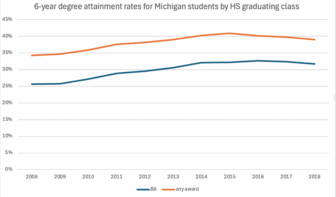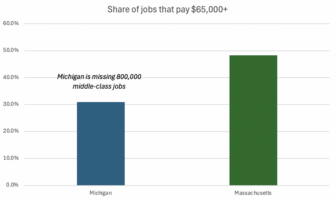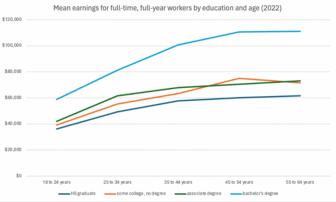Michigan Future is working on its first ever state policy agenda. The agenda will be designed to identify state policies that can raise living standards ![]() of all Michiganders.
of all Michiganders.
A big component of the agenda will be improving education attainment. Below is how we are thinking about education policy. Starting with what capacities are we trying to build in all kids. We should backward map from where we are trying to get rather than start with the tactical debates which are driving our politics today.
Our education policy recommendations are built on two core principles:
The education that is provided for affluent kids is, by and large, designed and executed differently than it is for non-affluent kids. One system delivering a broad college prep (dare we say liberal arts) education, the other increasingly delivering a narrow education built around developing discipline and what is on the test or now going back to narrowly preparing others’ children for a first job.
The second is that none of us have a clue what the jobs and occupations of the future will be. Today’s job are not a good indicator of what jobs will be when today’s K-12 students finish their careers in the 2050s or 2060s. We simply don’t know how smarter and smarter machines are going to change labor markets. So the purpose of pre K-12 education (maybe even pre K-16) is to build foundation skills that allow all Michigan children to have the agility and ability to constantly switch occupations. Our analogy: to be successful rock climbers, rather than climbing a predictable, linear career ladder.
What are the attributes we want our children to possess when they graduate from high school? The best place to begin to answer these question is with the schools where the affluent send their children and grandchildren.
The renowned Cranbrook Schools mission statement is:
Cranbrook Schools are independent day and boarding schools that provide students with a challenging and comprehensive college preparatory education. We motivate students from diverse backgrounds to strive for intellectual, creative, and physical excellence, to develop a deep appreciation for the arts and different cultures, and to employ the technological tools of our modern age. Our schools seek to instill in students a strong sense of personal and social responsibility, the ability to think critically, and the competence to communicate and contribute in an increasingly global community.
One of the traditional public school districts where residents pay a housing price premium so their kids can attend the schools is West Bloomfield. Their mission and vision statement:
The West Bloomfield School District educates students to be their best in and for the world. … We will develop socially responsible citizens empowered to meet the challenges of a rapidly changing global society, and who are characterized by curiosity, creativity, critical thinking and the ability to effectively communicate and collaborate.
These schools are broadly representative of the schools affluent parents send their kids to. They are about far more than students getting good tests scores (although academic achievement matters to them all) and these schools reject the notion that schooling should be about preparing students for today’s jobs or about meeting today’s job demand of Michigan employers. Increasingly the two standards we are asking of schools.
Instead what we should be asking of all pre K-12 schools is an education that prepares students for adult life in all its dimensions, not just for a job or even a career. An education that prepares students to pursue their dreams any place on the planet, not just here in Michigan. An education that is about being a lifelong learner, not just someone that scores well on a standardized test today.
Michigan’s current pre K-12 system is focused primarily on building content specific, left brain, cognitive skills. The kind of skills that are on standardized tests. Pre Common Core at not very rigorous levels in Michigan. It is increasingly clear that those skills are not what employers are primarily looking for nor are they the most important skills for college success.
What matters more are both the non cognitive skills detailed in Paul Tough’s How Children Succeed: grit, self control, zest, social intelligence, gratitude, optimism and curiosity. And non content specific cognitive skills delineated by the Partnership for 21st Century Learning (P21): creativity, communication, collaboration and critical thinking (the Four Cs). The Four Cs were developed out of a frustration by leading-edge companies with the skills recent graduates were bringing to the workplace.
Most of the schools in Michigan today that are organized around building broad skills, like the Four Cs, are schools which affluent students attend. Private schools and public schools districts with a high proportion of students from affluent families where most parents have a four year degree or more. These are schools designed from early childhood on to be college prep schools. The parents understand that the most reliable path to good-paying careers is a four year degree or more and the development of a broad, non-occupational specific, skill set that will build a foundation for their children to be successful over a forty year career which will be characterized by constant change.
If Michigan is going to a place with a broad middle class, if employers are going to have the long term supply of skilled workers they need and if Michigan is going to be a place once again where kids regularly do better than their parents it will happen first and foremost because the state made a commitment to provide an education system for all from early childhood through higher education that builds broad skills with rigor that are the foundation of successful forty year careers.






